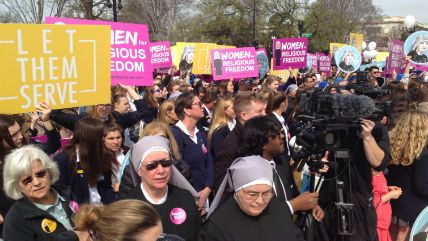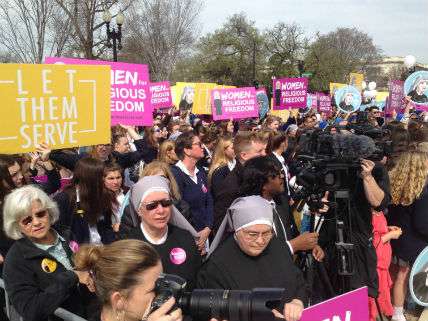Was Yesterday's SCOTUS Decision in Zubik a Win for Religious Liberty? You Bet It Was
That this case got as far as it did is an indictment of the Obama administration.


Yesterday the Supreme Court shocked most everyone by handing down a decision in Zubik v. Burwell (better known as the Little Sisters of the Poor case). This was unexpected because hot-button rulings often come late in the Court's term—Hobby Lobby v. Burwell, which decided a similar question two years ago, was announced on June 30 even though it, like this one, was argued in March.
The justices' decision here was also surprising for its unanimity. The more liberal wing was widely expected to side with the Obama administration in affirming the Health and Human Services (HHS) contraception mandate as not violating the Religious Freedom Restoration Act (RFRA). In the absence of a full bench, a 4–4 split would have upheld the four lower courts' rulings against the Catholic nuns who have become the face of this controversy and the other six petitioners (including Pittsburgh Bishop David Zubik). This was what people overwhelmingly predicted would happen after the conservative Justice Antonin Scalia passed away in February.
But the Supreme Court didn't split 4–4; instead, the eight justices all agreed to vacate the lower courts' ruling, remanding the case back down to be heard again in light of the "clarification and refinement in the positions of the parties" that have emerged.
This has been widely described as "punting" on the question at hand. And in a sense that's right—the justices explicitly said they were declining "to decide whether petitioners' religious exercise has been substantially burdened, whether the Government has a compelling interest, or whether the current regulations are the least restrictive means of serving that interest."
But really that's a lot of hogwash. As David French wrote at National Review, "Speaking as a person who's argued a few cases in courts of appeal — when the court vacates the ruling you're challenging, that's a win."
Whether the justices want you to see it this way or not, their decision amounts to a ruling against the government, which argued that (a) the HHS "accommodation" offered to the Little Sisters and the other religious nonprofits doesn't substantially burden their religious exercise; and (b) even if it does, it's the least restrictive means of furthering a compelling government interest of providing free and seamless contraception coverage to the employees of religious nonprofits.
How do I know the Court believes there are less burdensome ways to achieve that end? Because it already proposed one and got both sides to agree to it.
In the days following oral arguments, the justices took the unusual step of asking the parties to the suit to provide "supplemental briefs" specifically addressing whether the outcome the administration wants could be accomplished without any involvement from the religious employers. Both the petitioners and the government answered that an arrangement whereby the insurance company, and not the employer, is responsible for making the coverage available through a separate plan would be acceptable.
This is the "new development" the Court is using to justify returning the case to the lower courts. In essence, it got the administration to formally concede there are less restrictive ways to make sure women have seamless access to free birth control (which it reluctantly acknowledged despite the solicitor general having spent his oral argument time rigidly insisting that there could be no possible other method of achieving the government's end).
In challenging the "accommodation," the petitioners were saying they could not in good conscience take the affirmative step of notifying the government about their refusal to provide contraception coverage, because they knew that doing so would trigger the government to force their insurance providers to offer the coverage anyway. This would make them complicit in a sinful act. The result of this ruling is that they almost certainly won't have to do the thing to which they were strongly on moral grounds opposed.
That the administration has spent the last four years threatening these seven religious nonprofits with millions of dollars in punitive fines when it now admits the groups' involvement in providing this coverage isn't even necessary is at best an indictment of the judgment of the left—and at worst an indictment of its motives.


Show Comments (148)